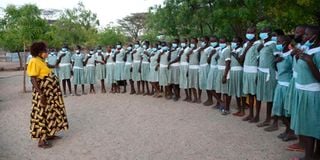Premium
I provide a safe haven for children to keep their teen mothers in school

Nalemsekon Primary School headteacher Margaret Akoru talking to her students at the school on March 1,2022.
As the sun rose, ushering in a new day, learners at Nalemsekon Primary School in Turkana County were already sweating through their school uniforms. In this part of the country, it’s scorching hot; now tie that to the punishing spring of drought.
Unbothered by the heat, the boys and girls go on with school activities – learning, sweeping, cleaning and playing. Then the bell rings and a group of girls assembles in the dining hall. It is easy to note that their school uniform is still new and I learn that they resumed school this year.
When the Covid-19 pandemic hit the country, leading to the partial closure of schools, teenage pregnancy numbers rose sharply in Turkana. Between March and June 2020, more than 558 adolescent girls got pregnant, according to the Ministry of Health.
To Margaret Akoru, the headteacher of this school, the news that some of her learners were expectant hit her hard. It was like lightning striking the same place twice. It reminded her of a call she received sometime in 2013.
“It was my sister on the line. She said, “Margaret, your daughter is pregnant. She was 14 years old then and a Kenya Certificate of Primary Education (KCPE) candidate for that year. She was living with her,” she recounted the circumstances and how she was seething with anger as she processed the news.
“I kept wondering, ‘What has she done now?’ I felt that she had embarrassed our family and myself especially because of my Christianity grounding and role in the church,” Margaret recalls.
When many girls report that they are pregnant, it is a pronouncement that marks an end to their education so they can take care of their babies. However, this is not a path she wanted for her daughter.
“I was born and brought up in Turkana. Some decades ago, educating girls was not a priority. They stayed at home watching over goats and cows as their brothers got empowered in school. My father was a chief and he decided to enroll us in school.
“I remember the backlash from our neighbours. They couldn’t understand why we were going to school. Years later, I meet some of them and they wish that they had what we got- a chance to go to school and most importantly, choices,” she offers.
After her daughter was done nursing the baby, she volunteered to take care of her child and sent her back to school. “My daughter is done with her college education and is currently job hunting. Her son is now in grade five,” offers the proud mother.
When Margaret’s house help’s daughter became pregnant while in primary school, she extended the same helping hand and took it upon herself to raise the baby so she could resume school.
“I am currently taking care of four girls and two boys in my home. Then, I thought of other girls and felt the need to do something about it,” she narrates.
Through the help of other teachers and the chief, she made calls for teenage mothers who were willing to resume studies and had someone to watch over their children. “We had more than 30 girls showing up at the school. Due to limitation of resources and the fact that some girls didn’t have anyone to leave the children with, we decided to start with 12 girls,” Margaret says.
With the money received from her merry-go-round chama, she bought school uniforms for the girls and gave them books from the school’s library. “I rallied the teachers and we were able to get them other items such as shoes and stationery,” says the headteacher.
Also coming to their aid is United Nations Children's Fund (Unicef). The UN body designed to address the needs of children and women in developing countries delivered what they call dignity kits- a package composed of sanitary towels and other personal effects.
In partnership with Educate a Child, Unicef is supporting the Government of Kenya to bring more girls back to school, through the Out of School Children programme. Besides, they offer training on how to mentor the girls.
“So, every week, we meet the girls to encourage and check on them. To ensure that they don’t face stigmatisation, we have integrated them with other learners whom I must say have been very supportive. Yet, a lot still needs to be done to ensure that young teenage mothers continue with their pursuit of education,” she says.
Faith Lobuin, 15, is one of the teenage mothers who’s been supported by Margaret. She was in grade five when she became pregnant. “I felt very sad because I was concerned that I would never go back to school. When other girls would pass by our manyatta (homestead) coming from school, I would feel very bad. When I heard that the school was giving us a chance, I was elated,” says the teenager.
Her grandmother, whom she lives with, watches over her six months old son as she attends school.
“Mrs Margaret has been very helpful. Besides the inspirational talks, she frequently provides us with money, flour, and washing powder. She even meets the cost for exams because she doesn’t want us to miss school for one reason or another,” says the thankful girl.
To Margaret, education is still the key to success. “I am very intentional with teenage mothers because most of them get rejected by society when they get pregnant. My hope is to have as many of them go back to school. My children ask, ‘Mum, you are retiring this year, who will continue with your legacy?’ I tell them, ‘you will’.”



